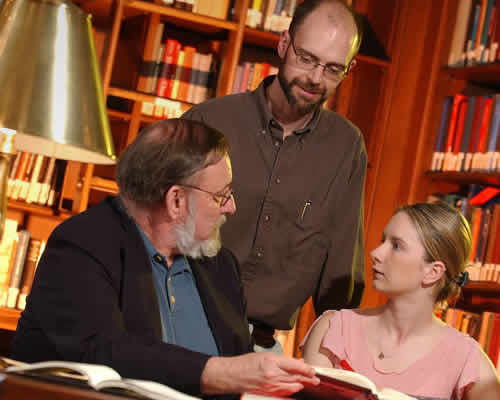Meredith Sabosik ’02 (Brick, N.J.) wants to find out whether anti-trust laws are up to the challenge of today’s fast-paced market. She is undertaking a yearlong study in pursuit of departmental honors in both of her majors, government and law and economics and business. Sabosik’s interest in antitrust laws, the high-tech business world, and monopolies gave her the topic for her thesis.
“I am very interested in determining whether this new high-tech world of computers and cell phones will force us to change the way in which we prosecute monopolies, which has been the same since 1890,” says Sabosik. “I have not done any previous research on this topic, but I have always been amazed by how fast things are moving today and how fast things seem to become outdated.”
“When Microsoft was first prosecuted I was very interested to see how the court would react and to see if Microsoft would be broken apart, like AT&T,” continues Sabosik. “My thesis topic deals with antitrust laws given the challenges that modern day poses to them. I will be examining the Microsoft case, as well as the AT&T and possibly the Standard Oil cases. From these cases I will determine how things have changed economically and how that affects antitrust laws. As a result, I may find that current antitrust laws may need to be revised in order to adapt to new high-technology and rapidly changing markets.”
To date, Sabosik has researched what other scholars have studied about the topic and is conducting further research to find support for her opinion that minor changes need to be made, such as having a separate court for anti-trust cases. “The jury should be made up of experts instead of a jury of one’s peers,” states Sabosik, who has conducted her own analysis of the Microsoft and Standard Oil cases and will be conducting interviews on the Microsoft case to further her research.
Sabosik has two advisers for her thesis: Christopher Ruebeck, assistant professor of economics and business, and James Lennertz, associate professor of government and law.
“Through this thesis, Meredith can extend the ideas that she has learned from Economics 331 to address issues of the law,” says Ruebeck. “She also gets a chance to weigh the importance of economic efficiency and justice under the law and how these concepts reinforce each other and how they conflict with each other. The research skills that she is learning are also valuable because coursework can’t teach students how to do this kind of thinking. She has to focus on a question, and then carefully describe her arguments.”
“It’s valuable to consider how the implementation of the law changes the landscape of the market, and how the features of markets can and/or should affect the law,” continues Ruebeck. “With her background in both areas, not only does she benefit from synthesizing the two, but her work is valuable for the same reason. There actually is some contention over whether justice has or should have anything to do with economics, but the courts’ decisions undeniably affect economic well-being.”
Ruebeck adds that Sabosik writes well and focuses clearly on the task at hand.
“I truly appreciate all the help that these two men have given me this past semester,” says Sabosik. “I have learned a lot from them and they have both contributed to my thesis making it this far. With this topic being so controversial and so complex, I would have been overwhelmed and on the wrong track if it had not been for them telling me to go further with one idea and to not be too concerned with another.”
Ruebeck says that Sabosik’s project is different from most economics and business majors’ projects because their theses are typically empirically oriented. Instead of running regressions of some social outcome, Sabosik’s thesis instead is about reviewing and synthesizing the literature, more typical of government and law majors. Sabosik says she is finding a strong interconnection between the two areas and discovering that economics will influence what happens in government.
Sabosik has a vested interest in reviewing court cases and the meanings or intentions behind antitrust laws because she plans to attend law school after she graduates.
A graduate of St. Rose High School, Sabosik is a peer tutor; agent for the Senior Class Fund Drive; reference chairman, chapter correspondent, and vice president of administration of Delta Delta Delta sorority; president of Panhellenic Council; and photo editor of Lafayette’s newspaper and yearbook. She takes part in a mentoring program sponsored by the Center for Women in Politics in Pennsylvania and is a member of the Order of Omega, the Greek Honor Society.

Meredith Sabosik ’02 presented honors research she did with professors James Lennertz of government and law and Christopher Ruebeck of economics and business at the National Conference on Undergraduate Research.
